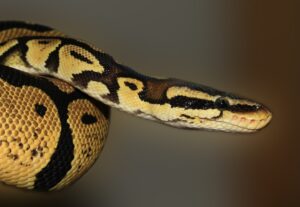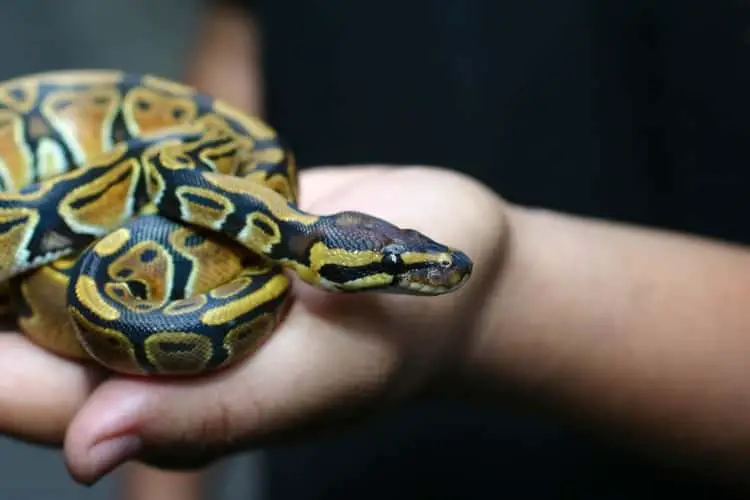Ball pythons are named after their nature to curl up into a ball. They can live up to 30 years in captivity and become adults at 3 years old. If they are properly cared for, mouth rot is completely preventable and if it does happen that they develop it then not to worry – it is easy to treat but do not leave it as it can develop into a more serious infection.
All reptiles are susceptible to ball python mouth rot (or even scale rot or shell rot) but snakes are the most at risk to develop it. If you’re concerned you’re ball python may have mouth rot here is what you’d need to know.
Ulcerative stomatitis – or more commonly called mouth rot – is an infection in your cold blooded friends mouth. Mouth rot can also refer to other infections. It can be caused by food or small cuts in their mouths, and is thankfully easily treatable and preventable. Lizards and snakes are the most prone to this. Similar infections that reptiles can develop are scale rot, or shell rot.
Owners are quick to diagnose any kind of mouth infection or disease as mouth rot, so it is absolutely imperative that you consult a reputable vet to confirm this diagnosis. While it could simply be mouth rot, an infection in your ball pythons mouth could also indicate a more serious issue.
You may also want to know if snakes can eat wild mice.
What is ball python mouth rot?
First off let’s take a look at what mouth rot is in ball pythons.
Ball pythons are a high risk to develop mouth rot. It is an infection that develops in their mouths, which is caused by food left between their teeth and small cuts within their mouths. Poor care of your reptile can lead to them developing this infection, and so in order to prevent it is vital that they are properly taken care of and their enclosures are regularly cleaned.
By taking your ball python for their yearly check-ups, and making sure their enclosure is cleaned regularly you can easily prevent them from developing mouth rot.
They should have plenty of space within their habitat, and the temperate and humidity should also be regulated. You should ensure that your ball python eats a nutritious and well-rounded diet. When checking your ball pythons. Be very gentle when you are handling your ball pythons mouths – their jaws are fragile and you can also injure other parts of their bodies if you are not careful.
If you do see food stuck in their mouths, you should remove it with a soft cotton swap. Your vet can advise you on the best way to handle your ball pythons mouths.
Mouth rot normally develops when your ball python is under stress and their immune systems are low so it is imperative that their environment and diet is properly taken care of and seen to.

Ball python mouth rot is preventable. Here you see a happy healthy ball python.
What are the symptoms of ball python mouth rot?
You should be checking your ball pythons mouth regularly and it is best to know what symptoms to look out for.
The first signs are usually a disinterest in food and water, and your ball python will likely decrease their intake as their mouth is in pain and they do not feel well.
Another symptom is if their saliva is thickening, and if there are yellow plaques in the soft tissue. They may also have yellow, cheese-like pus in and around their mouths. Their gums and teeth may swell, and in extremely advanced cases their faces may swell as well. Another sign to look out for is if they are resting with their mouths open.
If you spot any of these signs, it is vital that you contact a vet. Mouth rot is completely treatable, but if it is left alone it can become deadly.
If you are concerned about your little friend, and check their mouth do so with care and caution. If they don’t have mouth rot, a rough check of their mouth can cause them to develop it.
Is ball python mouth rot contagious?
Mouth rot can become contagious if it develops into pneumonia. Since its recommended to keep your ball python in a separate enclosure to begin with, this shouldn’t be an issue.
However since mouth rot normally occurs due to a lack of care, it is not known to be contagious.
How to cure ball python mouth rot at home:
Although it is highly recommended that you seek out professional veterinary help as human medicines can greatly harm your ball python. By keeping their mouths clean and monitoring the situation you may be able to cure it at home.
Clear the cheesy pus away with a Q tip – and make sure to do this gently. You can try using Betadine with some water to disinfect the area, but it is recommended you contact a vet beforehand. You can remove the cheese-like pus gently with a damp Q tip.
If the cheese-like pus continues to develop within your ball pythons mouth then you should definitely see a vet.
When to seek help for ball python mouth rot:
As mentioned it is highly advised that you seek veterinary help as soon as you suspect that your snake may have mouth rot. Understandably not everyone can afford vet fee’s as these can get expensive, but there are animal organisations that are normally willing to help for a lesser or no fee. You can also research what organisations are within your area.
In severe cases, a vet may have to remove any dead tissue from your ball pythons mouth. While mouth rot is easily treatable, it is really important that you do not leave it thinking it will resolve on its own. If left, mouth rot can develop into a deadly disease such as pneumonia as well.
A professional will administer the correct antibiotics and will clean out your ball pythons mouth with an antiseptic. If it is necessary they may be put on a fluid therapy and nutritional support – this is only done if they cannot eat while they are recovering.
In conclusion:
Ultimately, ball python mouth rot is a highly preventable and treatable infection but it can become deadly if it is left alone. It is caused by food that is left in the gums, and small cuts within the mouth.
Mouth rot can also refer to a number of infections. The first symptom is normally your cold blooded friend will lose interest in food and water, and may begin to salivate a lot more. If they begin to develop a cheese-like pus in and around their mouths than it is more than likely that they are experiencing mouth rot.
It is not recommended that you treat it at home, but you can first try to keep the area clean and disinfected. There are a number of animal organisations that are willing to help for a lesser fee as vets can be expensive, but do seek professional help.
A vet will likely administer antibiotics and clean your ball pythons mouth with an antiseptic, and in severe cases will administer fluids and nutritional support and may even need to remove any dead tissue. Prevention is key so be sure to take care of your ball python and make sure all of their needs are met.
Why not check out more of our ball python articles?
